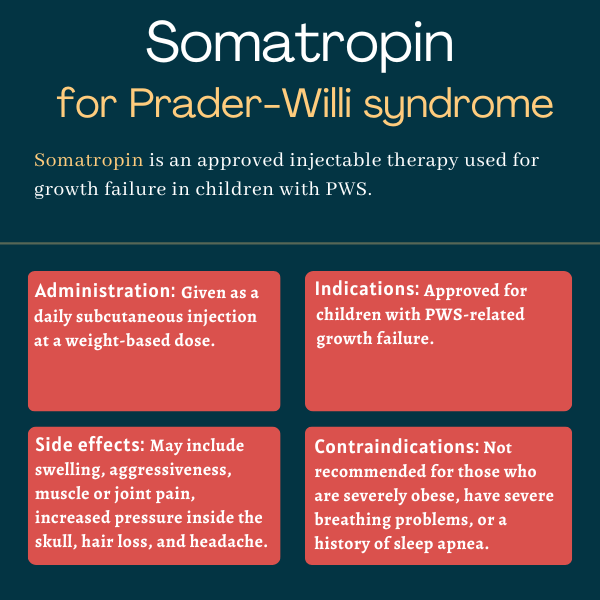Somatropin for Prader-Willi syndrome
Last updated Sept. 17, 2025, by Margarida Maia, PhD

What is somatropin for Prader-Willi syndrome?
Somatropin is a lab-made, or recombinant, human growth hormone approved to treat growth failure in children with Prader-Willi syndrome (PWS).
Growth hormone, found at deficient levels in 40% to 100% of people with PWS, regulates several biological processes, including growth during childhood and adolescence, body composition, and metabolism of blood sugar and fats. Growth hormone deficiency can result in short stature, increased fat mass, and reduced muscle mass.
Administered as an under-the-skin, or subcutaneous, injection, somatropin works to restore growth hormone levels, which is expected to increase height, improve weight distribution, lower body fat, and increase muscle mass.
In the U.S., somatropin is approved for children with PWS-related growth failure under the brand names Genotropin and Norditropin. Omnitrope is a biosimilar to Genotropin, meaning that it is highly similar to and has no clinically meaningful differences from the brand-name product. These therapies may also be used in adults with PWS upon verification of growth hormone deficiency.
Other brand names for somatropin — Humatrope, Zomacton, Nutropin AQ, and Saizen — can be used for growth hormone deficiency in children and adults with PWS.
Therapy snapshot
| Brand name: | Genotropin, Norditropin, Omnitrope |
| Chemical name: | Somatropin |
| Usage: | Treatment of growth failure in children with PWS |
| Administration: | Subcutaneous injection |
Who can take somatropin?
In the U.S., somatropin is approved to correct short stature in children with genetically-confirmed PWS who have growth failure.
According to the therapy’s prescribing information, its use is contraindicated, due to the risk of sudden death, in children with PWS who:
- are severely obese
- have a history of upper airway obstruction or sleep apnea (repetitive pauses in breathing during sleep)
- experience severe breathing problems.
Children with closed epiphyses (growth plates) on X-rays, meaning that longitudinal bone growth has stopped, should also not be treated with somatropin.
The therapy is also not recommended for anyone with:
- active cancer
- a history of allergic reactions to the medication or any of its ingredients
- severe eye problems due to diabetes.
Somatropin is approved in the European Union for a similar indication.
How is somatropin administered in Prader-Willi syndrome?
Somatropin is administered by subcutaneous injection. The recommended weekly dose is generally 0.24 mg per kilogram of body weight, divided into six or seven daily doses. Dosage and administration schedule should be tailored to each child based on growth response.
Specific delivery devices and formulations can vary by brand, but all allow patients or caregivers to administer the medication through pre-filled syringes or pens after appropriate training.

Somatropin in Prader-Willi syndrome clinical trials
Somatropin’s approval in the U.S. was based on data from two clinical trials that involved a total of 43 children with PWS. Participants were randomly assigned to receive somatropin (at a weekly dose of 0.24 or 0.36 mg per kilogram of body weight) or no treatment for a year, after which all were given the therapy for another year. Results showed that, compared with no treatment, one year of somatropin significantly:
- improved growth
- reduced fat mass
- increased lean body mass
- improved the ratio of lean-to-fat tissue.
The children’s growth showed improvements in the second year, when both groups received the therapy. Benefits were seen without speeding up bone aging. No significant changes in body weight were observed between the groups.
Common side effects of somatropin
The most common side effects of somatropin reported in children with PWS in clinical trials include:
- swelling
- aggressiveness
- muscle or joint pain
- increased pressure inside the skull
- hair loss
- headache.
Because of a risk of sudden death, children with PWS should be evaluated for signs of upper airway obstruction and sleep apnea before and during treatment with somatropin. If there are signs of these issues during treatment, somatropin should be discontinued.
The therapy may cause other safety issues that require monitoring and/or adjustments in treatment, including:
- impaired tolerance to blood sugar, which may lead to diabetes
- progression of existing scoliosis, a side-to-side curve of the spine
- severe allergic reactions
- low function of the adrenal glands or low blood levels of the cortisol hormone
- low thyroid function
- slipped capital femoral epiphysis, a condition where the head of the thigh bone slips out of place, causing pain
- increased risk of cancer growth for patients with an active tumor or cancer
- increased blood levels of certain molecules, enzymes, and hormones
- pancreas inflammation.
Prade-Willi Syndrome News is strictly a news and information website about the disease. It does not provide medical advice, diagnosis, or treatment. This content is not intended to be a substitute for professional medical advice, diagnosis, or treatment. Always seek the advice of your physician or other qualified health provider with any questions you may have regarding a medical condition. Never disregard professional medical advice or delay in seeking it because of something you have read on this website.
Recent Posts
- Starting growth hormone before age 2 does not harm PWS sleep
- I’m hopeful a new treatment will benefit my son with Prader-Willi syndrome
- Palatin to test 2 obesity-targeting drugs for PWS in clinical trials this year
- Still-recruiting ARD-101 trial for PWS lowers US enrollment age to 7
- For rare disease families, February is a month of both love and awareness
- Muscle, bone signaling imbalances found in non-obese PWS children
- Most PWS patients meet nutrient targets but struggle with calorie control
- Adults with PWS need lifelong support in daily activities, study finds
- Celebrating a milestone in life with Prader-Willi syndrome
- New technique ‘wakes up’ silent genes in Prader-Willi in lab testing